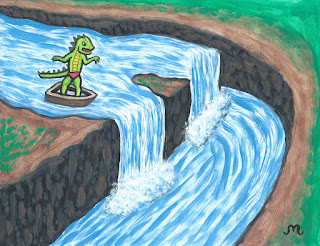How Long Do We Have Until We Run Out of Freshwater?
Chennai, one of my favorite cities in India, ran out of freshwater last summer. I was there during that time and it was a depressing sight. I saw large numbers of haggard women and children standing on dusty roads in the scorching sun waiting for water trucks. Life in the bustling city of five million appeared to have come to a halt.
Can this happen to other cities? How much freshwater do we have?
Despite Earth’s abundance of total water, less than 3% is fresh. About two-thirds of that is locked away in ice caps and glaciers. That leaves less than 1% of total freshwater on the ground for consumption in the form of rivers, lakes and so on.
Though the percentage is minuscule, the volume is plenty—about 2.2 million gallons for each person on earth. The statistic gets even better when we view it in the context of the minimal 13 to 25 gallons of water that individuals need daily for their basic domestic and sanitary needs.
However, water is not uniformly distributed across the globe. The USA, for example, has nearly twice the quantity of freshwater as in India, even though its population is only a fraction of the latter. Then there is uneven usage. Five giant global food and beverage corporations—Nestle, Danone, Unilever, Anheuser-Busch, and Coca-Cola—consume enough water to meet the daily domestic needs of every person on the planet. Finally, there are the demands of livestock, crops, and the wild.
Theoretically, there is enough water to last about 5,000 years for the basic needs of the human population, however, the day of reckoning has already arrived for many cities from Flint, Michigan to Mexico City, Mexico.
Water is undoubtedly becoming the world’s scarcest critical resource. For those of us that are fortunate to have a copious amount of water, we need to diligently conserve it, whether that means taking less time in the shower or purchasing low-flush toilets.
Can this happen to other cities? How much freshwater do we have?
Despite Earth’s abundance of total water, less than 3% is fresh. About two-thirds of that is locked away in ice caps and glaciers. That leaves less than 1% of total freshwater on the ground for consumption in the form of rivers, lakes and so on.
Though the percentage is minuscule, the volume is plenty—about 2.2 million gallons for each person on earth. The statistic gets even better when we view it in the context of the minimal 13 to 25 gallons of water that individuals need daily for their basic domestic and sanitary needs.
However, water is not uniformly distributed across the globe. The USA, for example, has nearly twice the quantity of freshwater as in India, even though its population is only a fraction of the latter. Then there is uneven usage. Five giant global food and beverage corporations—Nestle, Danone, Unilever, Anheuser-Busch, and Coca-Cola—consume enough water to meet the daily domestic needs of every person on the planet. Finally, there are the demands of livestock, crops, and the wild.
Theoretically, there is enough water to last about 5,000 years for the basic needs of the human population, however, the day of reckoning has already arrived for many cities from Flint, Michigan to Mexico City, Mexico.
Water is undoubtedly becoming the world’s scarcest critical resource. For those of us that are fortunate to have a copious amount of water, we need to diligently conserve it, whether that means taking less time in the shower or purchasing low-flush toilets.
Sources:



Comments
Post a Comment